八年级英语M1同步及现在进行时、过去进行时讲与练
八年级语法过去进行时在线辅导讲解与练习

过去进行时在线辅导讲解与练习(含答案)过去进行时是表示过去某一时刻或某一时间内正在进行或发生的动作。
可以从两个方面来理解:1 过去某一时刻正在进行或发生的动作。
E.g. They were playing football at ten o'clock yesterday morning. My mother was cooking when I got home. I was washing my clothes at this time yesterday.2 过去某阶段持续进行的动作 What were you doing during the holiday? 另外,在复合句中,若主要动作和背景动作是同时发生的,那么主从句都可用过去进行时e.g. Jenny was reading while Danny was writing.其结构是助动词be的过去形式was/were +v-ing.其句式变化仍然要在be上做文章。
E.g. We were working in class.We weren't working in class. Were you working in class?过去进行时常与过去某一特定时间的状语连用,如 last night, at that time, at noon yesterday, last Sunday 等。
也有时没有时间状语,要通过上下文的暗示来确定用过去进行时。
E.g. The students all worked hard. Everyone knew what he was working for.做题时常见错误如下:一、易把be+现在分词记成be+过去分词例:He was talked (talk) to his mum at that time.答案:was talking解析:过去进行时与现在进行时结构上的区别体现在be动词上。
八年级上册英-语过去进行时(语法复习+习题训练)(解析版)
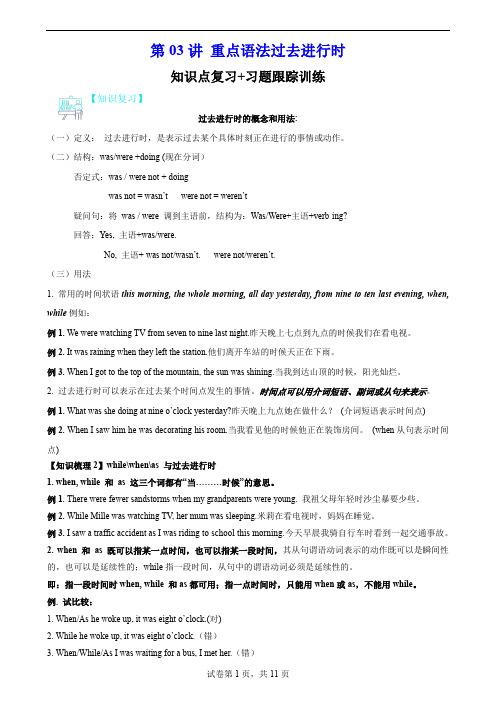
第03讲重点语法过去进行时知识点复习+习题跟踪训练【知识复习】过去进行时的概念和用法:(一)定义:过去进行时,是表示过去某个具体时刻正在进行的事情或动作。
(二)结构:was/were +doing (现在分词)否定式:was / were not + doingwas not = wasn’t were not = weren’t疑问句:将was / were 调到主语前,结构为:Was/Were+主语+verb-ing?回答:Yes, 主语+was/were.No, 主语+ was not/wasn’t. were not/weren’t.(三)用法1. 常用的时间状语this morning, the whole morning, all day yesterday, from nine to ten last evening, when, while例如:例1. We were watching TV from seven to nine last night.昨天晚上七点到九点的时候我们在看电视。
例2. It was raining when they left the station.他们离开车站的时候天正在下雨。
例3. When I got to the top of the mountain, the sun was shining.当我到达山顶的时候,阳光灿烂。
2. 过去进行时可以表示在过去某个时间点发生的事情。
时间点可以用介词短语、副词或从句来表示。
例1. What was she doing at nine o’clock yesterday?昨天晚上九点她在做什么?(介词短语表示时间点)例2. When I saw him he was decorating his room.当我看见他的时候他正在装饰房间。
(when从句表示时间点)【知识梳理2】while\when\as 与过去进行时1. when, while 和as 这三个词都有“当………时候”的意思。
人教新目标八年级下册过去进行时讲与练及答案

人教版八年级英语下册过去进行时●语法讲解1.构成:was/were+doing2.用法:过去进行时主要表示过去某一时间或某一段时间正在进行的动作。
如:His father fell and hurt himself while he was riding his bicycle.他爸爸骑自行车时摔了下来,受伤了。
3.常用时间状语:this morning, the whole morning, all day, yesterday, from nine to ten, last morning, when, while等。
4.when与while的区别(1)引导时间状语从句时,while连接的是时间段,而when连接的多是时间点。
如:What was your father doing while your mother was cooking?你妈妈做饭时,你爸爸在干什么呢?What was your mother doing when you came back?当你回来时,你妈妈在干什么呢?(2)while 可以连接两个并列的句子,而when不可以。
如:I was trying my best to finish my homework while my sister was watching TV.我当时正在尽力完成作业,而我妹妹正在看电视。
(3)when是特殊疑问词,可以对时间进行提问,而while不能。
如:When were you born?你什么时候出生的?过去进行时练习一、用动词的适当形式填空。
1.I ___________ (have) my breakfast at half past six yesterday morning.2.Mary _____________ (go) over her lessons from six to seven last night. John and Peter_____________(do) the same thing.3.What _____ you _______ (do) at that time? W e __________ (watch) TV.4.Was your father at home yesterday evening? Yes,he was. He _______ (listen) to the radio.5.They _____(not make) a model ship when I saw him.6.______ it _________(rain) when you left school? Yes, it ____. (No, it ____)7.What _____ your father _____ (do) when he was your age?8.One day, Edison __________ (wait) for a train to arrive, and suddenly a little boy ran to thetrack(轨道) to play.9.The three of them were in a hurry because their plane __________ (leave) in five minutes.10.She __________ (make) her dress the whole afternoon.11.While we _____________ (wait) for the bus, a girl __________ (run) up to us.12.I _____________ (telephone) a friend when Bob __________ (come) in.13.Jim __________ (jump) on the bus as it __________ (move) away.14.We __________ (test) the new machine when the electricity __________ (go) off.15.She __________ (not want) to stay in bed while the others ________________ (all, work)in the fields.二、选择题1. I ______ a meal when you _____ me.A. cooked, were ringingB. was cooking, rangC. was cooking, were ringingD. cooked, rang2. He said he _____ to draw a plane on the blackboard at that time.A. triesB. triedC. was tryingD. will try3. While she ______ TV, she ______ a sound outside the room.A. was watching, was hearingB. watched, was hearingC. watched, heardD. was watching, heard4. They _____ a football game from 7 to 9 last night.A. were watchingB. watchC. watchedD. are watching5. What book ____ you ______ when I ____ you at four yesterday afternoon?A. did, read, was seeingB. did, read, sawC. were, reading, sawD. were, reading, was seeing6. It was Friday evening. Mr and Mrs. Green _____ ready to fly to England.A. are gettingB. getC. were gettingD. got7. Lei Feng _____ always _____ of others when he ______ in the army.A. is, thinking, wasB. was, thinking, isC. did, think, isD. was, thinking, was8. A girl ______ my pen fall off the table when she _____ me.A. saw, passedB. was seeing, passedC. was seeing, pastD. was seeing, was passing9. We ____ for Tom at ten last Sunday. He often kept us ______.A. were waiting, waitingB. were waiting, waitC. waited, waitingD. waited, wait10. He ____ his father on the farm the whole afternoon last Saturday.A. helpsB. would helpC. was helpingD. is helping11. While mother _______ some washing, I _____ a kite for Kate.A. did, madeB. was doing, madeC. was doing, was makingD. did, was makingThey ______ too much noise.”12. “_______ you angry then?”“A. Are, were makingB. Were, were makingC. Are, madeD. Were, made13. He ____ some cooking at that time, so he _____ me.A. did, heardB. did, didn’t hearC. was doing, heardD. was doing, didn’t hear14. This time yesterday Jack _____ his bike. He _____ TVA. repaired, didn’t watchB. was repairing, watchedwatchingC. repaired, watchedD. was repairing, wasn’t15. His parents wanted to know how he _____ on with his new classmates.A. was gettingB. getsC. is gettingD. will get过去时中考真题Part 11. —What were you doing this time yesterday?—I ____ on the grass and drawing a picture.A. sitB. satC. am sittingD. was sitting2. While I ___________ TV, the bell rang.A. watchB. watchedC. am watchingD. was watching3. —Why didn’t you answer my telephone yesterday?—Sorry. I _______ a bath.A. tookB. takeC. am takingD. was taking4. While the alien _______ a souvenir, the girl called the police.A. was buyingB. boughtC. buysD. is buying5. —I called you at 6 o'clock yesterday evening, but nobody answered.— I'm sorry. I my friend download the movie Kung Fu Panda Ⅱwhen the telephone rang,A. would helpB. helpedC. was helping6. I along the road when I saw Peter. So we stopped and had a chat.A. walkedB. was walkingC. would walkD. had walked7. —What did the teacher say just now?—Sorry. I didn’t catch it. I ____ something else.A. thinkB. will thinkC. was thinkingD. had thought8. When I came back yesterday evening, my brother ________ his homework.A is doing B. has done C. was doing9.Mrs White _____dinner when her son came home.A. is cookingB. was cookingC. are cookingD. were cooking10. —Did you see Mr. Black just now?—Yes. He ______ his car when I met him.A. parkedB. was parkingC. parksD. will park11. — Amy, I called you yesterday evening, but nobody answered the phone.— Oh, I _________ a walk with my mother at that time.A. takeB. tookC. am takingD. was taking12.Yesterday evening, I ___along the street when I suddenly met my maths teacher.A. walkB. walkedC. was walkingD. am walking13.— Where were you at 7:00 last night?— I _____ to my mom at home.A. writeB. was writingC. wrote14. —Why didn’t you go to play football with us yesterday afternoon?—I _____my mother with the housework then.A. helpedB. was helpingC. had helpedD. have been helping15. He ____when the UFO arrived. He didn’t wake until the UFO disappeared.A. sleptB. was sleepingC. was doing homeworkD. was singing16. I_______ my homework at nine o'clock last Sunday morning.A. am doingB. was doingC. do17. I was very angry with John—he just_______ when I spoke to him.A. isn’t listeningB. hasn’t listenedC. didn’t listenD. wasn’t listening18. —I called you at 4:00 yesterday afternoon, but no one answered.—Sorry, I _____ with my friends at that time.A. swimB. swamC. will swimD. was swimming19. Mr. Li _____ us a report on our environment when the earthquake happened in Japan.A. gaveB.is givingC.was giving20. — Mr. Lee ______ to a student when I entered the classroom this morning.- He is very patient ______ he is young.A. talking; butB. talks; thoughC. was talking, thoughD. talked, however21.—Were you at school when he came to see you?—Yes, I ______ a math class.A. hadB. was havingC. am havingD. have22. I met a good friend of mine while I on the street.A. walksB. walkC. was walkingD. am walking23. I ________ when the UFO landed.A. am watching TVB. was watching TVC. have watched TVD. watched TV24. The girl with two cats in the yard when the earthquake happened.A. was playingB. is playingC. are playingD. were playingPart 21. Paul and I ____ tennis yesterday. He did much better than 1.A. playB. will playC. playedD. are playing2. A big party was held in NO.18 Middle School last night, the teacher with students _____ singing and dancing happily at the party.A. isB. wasC. areD. were3. Mr. Black is going to marry a girl he _______ in Japan last year.A. meetsB. metC. has metD. would meet4. He went into his room, the light and began to work.A. has turned onB. turned offC. turned onD. has turned off5.—What did Mr. Smith do before he came to China?—He in a car factory.A. worked B.works C.is working D.will work6. —Have you ever been to Hong Kong?—Yes, I ___there last month.A. went toB. have beenC. went7. This morning I had hardly got to my school when it_____ to rain.A. had begunB. was beginningC. beganD. begins8.—You have found your lost umbrella, haven’t you?—Yes. I _____ it behind the door this afternoon.A. have foundB. will findC. found9. Tom, along with three other boys, _______ seen playing football a moment ago.A. isB. wasC. areD. were10. Ten minutes ago, there______ an eraser, a pen and some books on the desk.A. wasB. wereC. is11. — How was your trip to Hang Zhou, Jim?—Great! We ___ to Xixi National Wetland Park.A. goB. am goingC. will goD. went12. – Do you know who cleaned the blackboard, Tina?-- Yes. John _____.A. doB. doesC. did13. The last time I ______ to the cinema was two years ago.A. goB. have goneC. have beenD. went14. — Have you ever been to Canada?— Yes, I there last year with my parents.A. have beenB. have goneC. wentD. go15. I called you, but nobody answered. Where _______ you?A. isB. areC. wasD. were16. ---Have you ever been to Shanghai?---Yes. I _____ there a few months ago.A have been B. went C. have gone17. What’s the best present you have ever ________?A. receivedB. receivesC. receiving18.—Lin Kai, hand in your homework, please.—Oh, sorry. I ______ it at home this morning.A. was leavingB. has leftC. will leaveD. left19. I'm now in New York with my friend Jenny. We_____ by plane on Monday.A.arriveB. arrivedC. are arrivingD. will arrive20.—Guess What! The great movie is on in the cinema.一Nothing new.I_________ it with my parents on the first day.A. saw B.see C.will see D. have been21. If it had been fine yesterday, we could have watched that air show. But it ____ all day.A. has rainedB. had rainedC. rainedD. rains22. –When _______ your mother _______ you that blue dress, Lucy?Maybe two or three weeks ago.–Sorry, I really can’t remember.A. will; buyB. does; buyC. did; buy23. -I’ve got a ticket for the basketball game tonight.-Cool!How you it?A. had, gotB. did, getC. were, gettingD. will, get24. Hello! I'm very glad to see you. When________ you_________ here?A. did; arriveB. will; arriveC. have; arrivedD. are; arriving25. —I have to be off right now.—What a pity! I you could stay a little longer with us.A. thinkB. am thinkingC. thought26. Tom was so careless that he __ his right arm when he was riding to school.A. hurtsB. hurtC. has hurtD. had hurt27. —I ______ something wrong just now. May 1 use your eraser?—Of course. Here you are.A. writeB. wroteC. am writing过去进行时练习一、用动词的适当形式填空。
(完整版)初中英语过去进行时讲解及练习(可编辑修改word版)
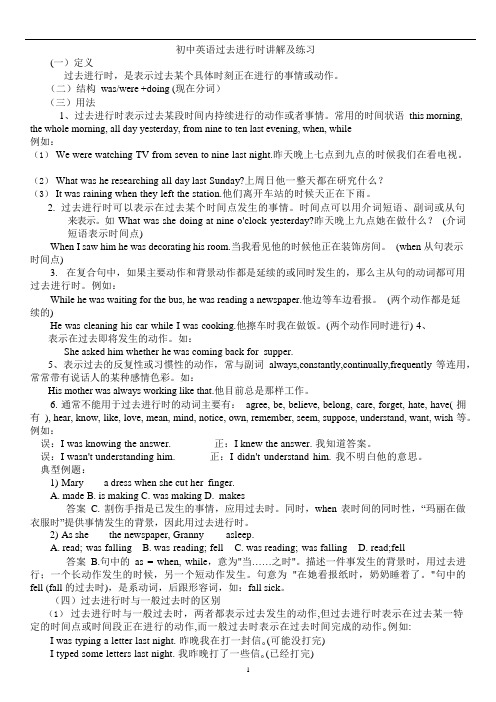
初中英语过去进行时讲解及练习(一)定义过去进行时,是表示过去某个具体时刻正在进行的事情或动作。
(二)结构was/were +doing (现在分词)(三)用法1、过去进行时表示过去某段时间内持续进行的动作或者事情。
常用的时间状语this morning, the whole morning, all day yesterday, from nine to ten last evening, when, while例如:(1)We were watching TV from seven to nine last night.昨天晚上七点到九点的时候我们在看电视。
(2)What was he researching all day last Sunday?上周日他一整天都在研究什么?(3)It was raining when they left the station.他们离开车站的时候天正在下雨。
2.过去进行时可以表示在过去某个时间点发生的事情。
时间点可以用介词短语、副词或从句来表示。
如What was she doing at nine o'clock yesterday?昨天晚上九点她在做什么?(介词短语表示时间点)When I saw him he was decorating his room.当我看见他的时候他正在装饰房间。
(when 从句表示时间点)3.在复合句中,如果主要动作和背景动作都是延续的或同时发生的,那么主从句的动词都可用过去进行时。
例如:While he was waiting for the bus, he was reading a newspaper.他边等车边看报。
(两个动作都是延续的)He was cleaning his car while I was cooking.他擦车时我在做饭。
(两个动作同时进行) 4、表示在过去即将发生的动作。
如:She asked him whether he was coming back for supper.5、表示过去的反复性或习惯性的动作,常与副词always,constantly,continually,frequently 等连用,常常带有说话人的某种感情色彩。
八年级上册英语m1的语法知识点
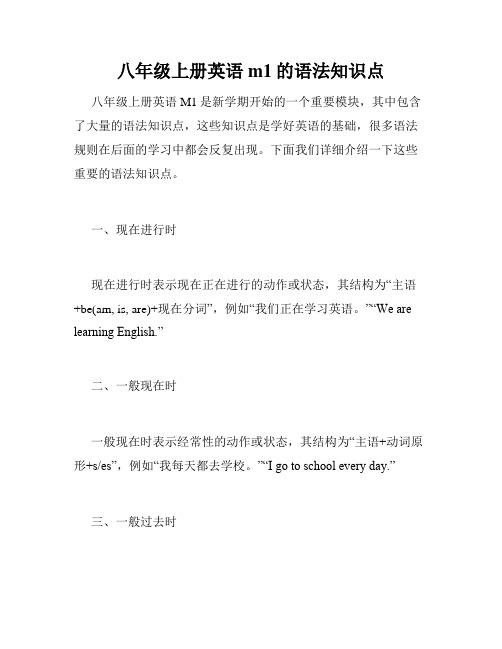
八年级上册英语m1的语法知识点八年级上册英语M1是新学期开始的一个重要模块,其中包含了大量的语法知识点,这些知识点是学好英语的基础,很多语法规则在后面的学习中都会反复出现。
下面我们详细介绍一下这些重要的语法知识点。
一、现在进行时
现在进行时表示现在正在进行的动作或状态,其结构为“主语+be(am, is, are)+现在分词”,例如“我们正在学习英语。
”“We are learning English.”
二、一般现在时
一般现在时表示经常性的动作或状态,其结构为“主语+动词原形+s/es”,例如“我每天都去学校。
”“I go to school every day.”
三、一般过去时
一般过去时表示过去某个时刻或一段时间内所发生的动作或状态,其结构为“主语+动词过去式”,例如“昨天我看了一部电影。
”“Yesterday I watched a movie.”
四、现在完成时
现在完成时表示过去发生的动作对现在的影响或结果,其结构为“主语+have/has+过去分词”,例如“我已经完成了作业。
”“I have fin ished my homework.”
五、一般将来时
一般将来时表示将要发生的动作或状态,其结构为“主语+will+动词原形”,例如“明天我将会去上学。
”“I will go to school tomorrow.”
六、情态动词
情态动词有can、could、may、might、must等,表示能力、请求、建议、推测等不同的意义。
它们的用法比较灵活,请注意。
以上就是八年级上册英语M1的主要语法知识点,希望同学们能够认真学习,并在后续的英语学习中逐步熟练掌握。
英语语法过去进行时讲解与习题

过去进行时讲解与习题过去进行时是表示过去某一时刻或某一时间内正在进行或发生的动作。
可以从两个方面来理解: 1 过去某一时刻正在进行或发生的动作。
They were playing football at ten o’clock yesterday morning. My mother was cooking when I got home. I was washing my clothes at this time yesterday. 2 过去某阶段持续进行的动作What were you doing during the holiday? 另外,在复合句中,若主要动作和背景动作是同时发生的,那么主从句都可用过去进行时Jenny was reading while Danny was writing.其结构是助动词be的过去形式was/were +v-ing.其句式变化仍然要在be上做文章。
We were working in class.We weren’t working in class.Were you working in class?过去进行时常与过去某一特定时间的状语连用,如last night, at that time, at noon yesterday, last Sunday 等。
也有时没有时间状语,要通过上下文的暗示来确定用过去进行时。
The students all worked hard. Everyone knew what he was working for.1.过去进行时的构成过去进行时是由“was / were +现在分词”构成的。
I was doing my homework at this time yesterday.昨天的这个时候我正在做作业。
Were you expecting him yesterday?你昨天一直在等他吗?They were not talking when I came in.我进来的时候他们没在说话。
(完整)外研版__初二上册__四种基本时态__英语复习M1和M4
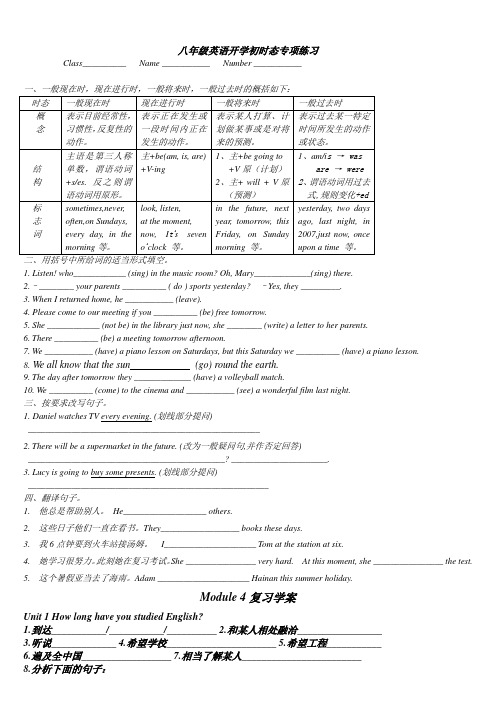
八年级英语开学初时态专项练习Class__________ Name ___________ Number ___________1. Listen! who____________ (sing) in the music room? Oh, Mary_____________(sing) there.2.–________ your parents __________ ( do ) sports yesterday? –Yes, they _________.3. When I returned home, he ___________ (leave).4. Please come to our meeting if you __________ (be) free tomorrow.5. She ____________ (not be) in the library just now, she ________ (write) a letter to her parents.6. There __________ (be) a meeting tomorrow afternoon.7. We ___________ (have) a piano lesson on Saturdays, but this Saturday we __________ (have) a piano lesson.8.We all know that the sun _______ (go) round the earth.9. The day after tomorrow they _____________ (have) a volleyball match.10. We __________ (come) to the cinema and ___________ (see) a wonderful film last night.三、按要求改写句子。
新版八年级下册过去进行时讲解及习题(有讲解附练习)(2021年整理)
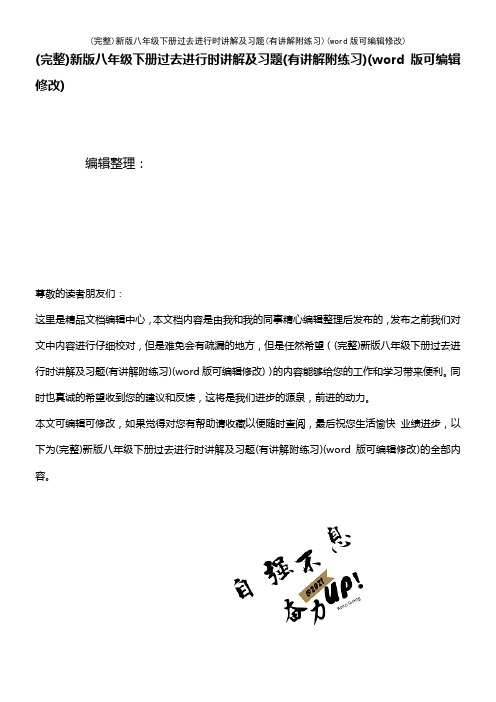
(完整)新版八年级下册过去进行时讲解及习题(有讲解附练习)(word版可编辑修改)编辑整理:尊敬的读者朋友们:这里是精品文档编辑中心,本文档内容是由我和我的同事精心编辑整理后发布的,发布之前我们对文中内容进行仔细校对,但是难免会有疏漏的地方,但是任然希望((完整)新版八年级下册过去进行时讲解及习题(有讲解附练习)(word版可编辑修改))的内容能够给您的工作和学习带来便利。
同时也真诚的希望收到您的建议和反馈,这将是我们进步的源泉,前进的动力。
本文可编辑可修改,如果觉得对您有帮助请收藏以便随时查阅,最后祝您生活愉快业绩进步,以下为(完整)新版八年级下册过去进行时讲解及习题(有讲解附练习)(word版可编辑修改)的全部内容。
过去进行时一.概念:过去进行时主要表示过去某个时刻或某一阶段正在进行的动作,常和表示过去的时间状语then,at that time/ moment, yesterday,at nine,last night 等连用或者与when, while, as引导的过去时间状语连用。
但在不少情况下,没有表示时间的状语,这时需要通过上下文来表示。
We were watching TV from seven to nine last night。
What was he researching all day last Sunday?二.过去进行时的主要用法是描述一件事发生的背景;一个长动作发生的时候,另一个短动作发生(长动作用过去进行时,短动作用一般过去时)。
也可以表示两个动作同时发生,此时均用过去进行时When I saw him he was cleaning his room。
While he was waiting for the bus, he was reading a newspaper。
He was cleaning his car while I was cooking.三.When/ While“当……的时候"的区别①when 既指时间点,也可指段时间,while只指段时间,因此when引导的时间状语从句中的动词可以是短暂性动词,也可以是延续性动词,而while从句中的动词必须是延续性动词。
- 1、下载文档前请自行甄别文档内容的完整性,平台不提供额外的编辑、内容补充、找答案等附加服务。
- 2、"仅部分预览"的文档,不可在线预览部分如存在完整性等问题,可反馈申请退款(可完整预览的文档不适用该条件!)。
- 3、如文档侵犯您的权益,请联系客服反馈,我们会尽快为您处理(人工客服工作时间:9:00-18:30)。
教学目的 1、掌握 be 动词的三种形式、相对应的过去形式及其用法; 2、掌握现在进行时的定义、用法、结构、现在分词的变化规则; 3、掌握过去进行时的定义、用法、结构、现在分词的变化规则; 1、现在进行时与过去进行时的区别; 2、现在分词的变化规则; 3、重点单词句型; 教学内容
A collect dolls
B collecting dolls C collection dolls
D collected dolls.
2 interview n.&v. 采访;会见;面试 【巧记提示】 inter-(前缀 “在一起;交互”) + view (见解;观察) 【经典例句】 The reporter interviewed an important person last night. 这个记者昨晚采访了一个重要人物。 【考点聚焦】 1)扩展词: interviewer n.接见(会见,采访)者 interviewing n.面试 2)常用短语: interview (v.) sb. about sth.关于……采访某人 give an interview (n.) to sb.接见某人 have an interview (n.) with sb.会见某人 3)interview 还有一个常见含义是“面试”,相关短语是 interview sb.(for sth.),含义是“(为了……)对某人进行面试或 是面谈” 3 develop v.发展;发达;进步 【经典例句】 Modern music was first developed in Italy. 现代音乐最初是在意大利发展起来的。 【考点聚焦】 1)扩展词:development n.发展 2)注意掌握 developed 和 developing 之间的区别: developed adj.发达的 developing adj.正在发展中的,开发的 4 imagine v.想像;设想 【经典例句】 I can’t imagine what he looks like.我想象不出他是什么长相。 【考点聚焦】 1)imagine 的相关短语: imagine doing sth.想像做某事 imagine sb. doing sth.想像某人做某事 imagine that ...想像…… 2)当 imagine,believe,think,suppose 等词后面接的从句为否定意义时,要否定主语中的谓语。 3)注意 imagine 后面的宾语可以是名词、动名词或是从句,但不可以是动词不定式。
2 Some hobbies are relaxing and others are creative.
有些爱好是休闲型的,有一些是创意型的。 【剖析】 本句是由 and 连接的并列句。others 和 some 对比使用时,表示“有一些”而不作“其他”讲。 【拓展】 1)relaxing 是表示“(东西)令人放松的”,而 relaxed 则表示“(人)感觉放松的”。
A. up
B. on
C. in
D. to
2 take up 【用法】占据(时间,空间) 【经典例句】 This table takes up too much room. 这张桌子太占地方了。 【考点聚焦】 含有 take 的相关短语: take away 拿走;带走 take sth. with sb.随身携带某物 take the medicine 吃药 【考题链接】Which hobby do you think takes ______ the least space?
4 Many teenagers love his book, and as a result, David has become a successful young writer.
很多十几岁的青少年喜欢读他的书,结果,大卫也因此而成了一名成功的年轻作家。 【剖析】 本句中 as a result 后面的句子所表达的内容与前面句子所表达的内容构成因果关系。前面是因,后面是果。 【拓展】 successful 是个形容词,它的名词形式是 success,副词形式是 successfully。
1
13. _____(青少年) should study hard 智能梳理
重点单词有这些
1 collect 【用法】v.收集;搜集 【例句】 I like collecting stamps. 我喜欢集邮。 【考点聚焦】 1)扩展词:collection n. 收藏品;收藏物 2)掌握 collect 和 gather 的区别: gather 是常用词,指“收集,聚集,集合在一起”。His supporters gathered in the main square. collect 指“有计划、有选择地收集”。 【考题链接】My hobby is ______.
3 Hobbies can make you grow as a person, develop your interests and help you learn new skills。
爱好能够使你成长,培养你的兴趣,帮助你学习新的技能。 【剖析】 1)本句中有三个并列的动词短语:make you grow as a person, develop your interests and help you learn new skills.。 2)本句中的 grow as a person,主要是指人的各个方面的成长。包括外在的和内在的。 3)help sb. (to) do sth.帮助某人做某事。 【拓展】 1)在一句话中,当有多个词或短语并列时,前面几项分别用逗号隔开,最后两项用 and 相连。 2)can 是一个情态动词,后面要接动词的原形。
1.1. I like Listening to music because it brings me great e__________. 2.Would you like to enter that s__________ high school , Linda? 3.The little girl showed me her doll _______________(collect). 4. His mum has no _________________(兴趣) in his hobbies. 5. Your room is u__________. You must clean it up. 6. It’s difficult ________________(remember) so many words. 7. He wants to be a ________________(职业的) basketball player like Yao Ming. 8. Alice, you are so c________, where did you learn to draw like that? 9. The boys like all kinds of _______________(activity) . 10. It’s _____________(use) to learn English well. 11.of all my _____(收藏品), I like the car best 12.we all know china is a d______ country.
A. up
B. on
C. in
D. to
3 be interested in 对……感兴趣 【经典例句】 Are you interested in music? 你对音乐感兴趣吗? 【考点聚焦】 1)be interested in sth.指人对……感兴趣 2)interested 和 interesting 的区别: interested 表示“人对某物感兴趣的,指人的一种感受”,一般是人作主语。 interesting 表示“某东西令人感兴趣的”,一般是物作主语。
4 a bit
【用法】“有点儿” 【例句】It’s a bit cold today. 辨析:a bit 与 a little: 1)相同之处:a bit 与 a little 都可作程度副词,表示“稍微、一点儿”的意思,修饰动词、形容词、比较级等,二者 可以互换。例如: Will you please turn down the radio a bit/a little?(动词)请你把收音机声音关小一点好吗? She’s a bit/a little afraid of the teacher.(形容词)她有点怕老师。 Her mother feels a bit/a little better today.(比较级)她母亲今天感觉好一些。 2)不同之处: (1)a little 可以直接修饰不可数名词,而 a bit 修饰不可数名词时,只能用 a bit of。例如: Tom has a little money.=Tom has a bit of money. 汤姆有一点钱。 (2)a bit 和 a little 与 not 连用时,意思大相径庭。not a bit=not at all,意为“一点也不”;not a little=very much, 意为“十分”、“相当”、“极其”。例如: He is not a bit tired. 他一点也不累。 He is not a little tired. 他很累。
重点短语有这些
2
1 tidy up 【用法】整理;收拾 【经典例句】 Please tidy up the mess before you go. 在你走之前,请把东西整理好。 【考点聚焦】 1)tidy up 侧重于整理杂乱的东西。此处 up 是副词,被修饰的代词要放在它们中间。如: tidy it up;tidy them up 2)含有 up 的短语: get up 起床 stand up 起立 walk up 沿着……走;登上 turn up 提高音量 look up 向上看 【考题链接】Betty’s room is a bit untidy. So she’ll tidy it _______.
